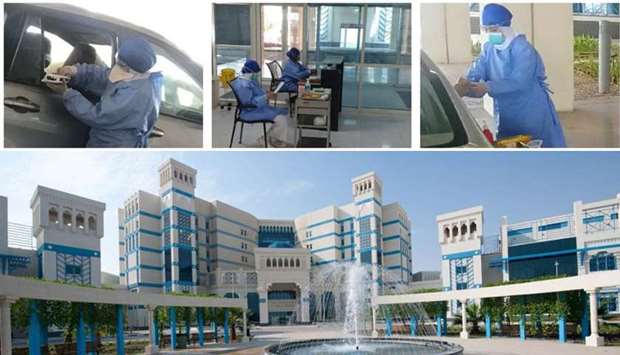As part of ongoing efforts to stop the spread of the novel coronavirus (Covid-19) and better serve the community, Hamad Medical Corporation (HMC) has launched what is thought to be the region’s first drive-thru anticoagulation service at Al Wakra Hospital.


A nurse wearing personal protective equipment assists a patient at the drive-thru anticoagulation service at Al Wakra Hospital
The service, which started earlier this month, is designed to protect the country’s most vulnerable residents from exposure to Covid-19 virus.
Dr Sabah Adnan al-Qadhi, medical director of Al Wakra Hospital, said the elderly and people with pre-existing medical conditions, such as heart disease, are most at risk for severe Covid-19 illness.

He noted that most patients with blood-clotting disorders who require anticoagulation services fall under both those categories.
“People using blood clot prevention medications require ongoing medical care. Implementing a drive-up testing service, which allows patients to have their blood drawn without leaving their vehicle, is part of our ongoing efforts to keep vulnerable populations safe,” said Dr al-Qadhi.
Dr Ezzideen Hamza Sawali, chair of cardiology and medical supervisor for the Anticoagulation Clinic at Al Wakra Hospital said patients taking blood clot prevention medications such as warfarin require ongoing monitoring and management. He says these patients must have blood samples taken regularly to determine their international normalised ratio.

“Many of our patients expressed concern about exposure to Covid-19, particularly when they were required to go into the hospital for their blood tests. Most of our patients are elderly and have co-morbid conditions and are at a higher risk of severe illness if they do contract Covid-19, so limiting their potential exposure to this virus is extremely important. Patients who require routine lab monitoring and medication dose adjustments can now get those services from their vehicle, rather than going into the hospital,” said Dr Sawali.
Patients are contacted a day in advance to confirm their appointment time. On the day of their appointment, a nurse wearing personal protective equipment will complete the necessary identification and medical screening processes before taking a sample of the patient’s blood, all from the window of their vehicle.
Dr Osama Abdelsamad, clinical pharmacy specialist and supervisor of the Anticoagulation Service for the Pharmacy Department at Al Wakra Hospital says in most cases follow-up care is completed over the telephone.
“Once the test results are returned, the pharmacist calls the patient to gather all necessary information and to confirm there are no changes to the patient’s condition and medications. This ensures the patient isn’t taking any other medications or experiencing any health issues which could impact how they respond to warfarin. Once the correct dosage is determined, a prescription is written and the patient receives their medication through our home delivery service,” said Dr Abdelsamad.
The Anticoagulation Service at Al Wakra Hospital is run by clinical pharmacists working under the supervision of specialised physicians. The clinic receives around 200 patients each month, 70% of them are elderly, have other chronic diseases, or have a history of surgery, which requires special measures to be taken to protect them from infection.
Dr Sabah Adnan al-Qadhi, medical director of Al Wakra Hospital, said the elderly and people with pre-existing medical conditions, such as heart disease, are most at risk for severe Covid-19 illness.

Dr Sabah Adnan al-Qadhi
He noted that most patients with blood-clotting disorders who require anticoagulation services fall under both those categories.
“People using blood clot prevention medications require ongoing medical care. Implementing a drive-up testing service, which allows patients to have their blood drawn without leaving their vehicle, is part of our ongoing efforts to keep vulnerable populations safe,” said Dr al-Qadhi.
Dr Ezzideen Hamza Sawali, chair of cardiology and medical supervisor for the Anticoagulation Clinic at Al Wakra Hospital said patients taking blood clot prevention medications such as warfarin require ongoing monitoring and management. He says these patients must have blood samples taken regularly to determine their international normalised ratio.

Dr Ezzideen Hamza Sawali
“Many of our patients expressed concern about exposure to Covid-19, particularly when they were required to go into the hospital for their blood tests. Most of our patients are elderly and have co-morbid conditions and are at a higher risk of severe illness if they do contract Covid-19, so limiting their potential exposure to this virus is extremely important. Patients who require routine lab monitoring and medication dose adjustments can now get those services from their vehicle, rather than going into the hospital,” said Dr Sawali.
Patients are contacted a day in advance to confirm their appointment time. On the day of their appointment, a nurse wearing personal protective equipment will complete the necessary identification and medical screening processes before taking a sample of the patient’s blood, all from the window of their vehicle.
Dr Osama Abdelsamad, clinical pharmacy specialist and supervisor of the Anticoagulation Service for the Pharmacy Department at Al Wakra Hospital says in most cases follow-up care is completed over the telephone.
“Once the test results are returned, the pharmacist calls the patient to gather all necessary information and to confirm there are no changes to the patient’s condition and medications. This ensures the patient isn’t taking any other medications or experiencing any health issues which could impact how they respond to warfarin. Once the correct dosage is determined, a prescription is written and the patient receives their medication through our home delivery service,” said Dr Abdelsamad.
The Anticoagulation Service at Al Wakra Hospital is run by clinical pharmacists working under the supervision of specialised physicians. The clinic receives around 200 patients each month, 70% of them are elderly, have other chronic diseases, or have a history of surgery, which requires special measures to be taken to protect them from infection.

